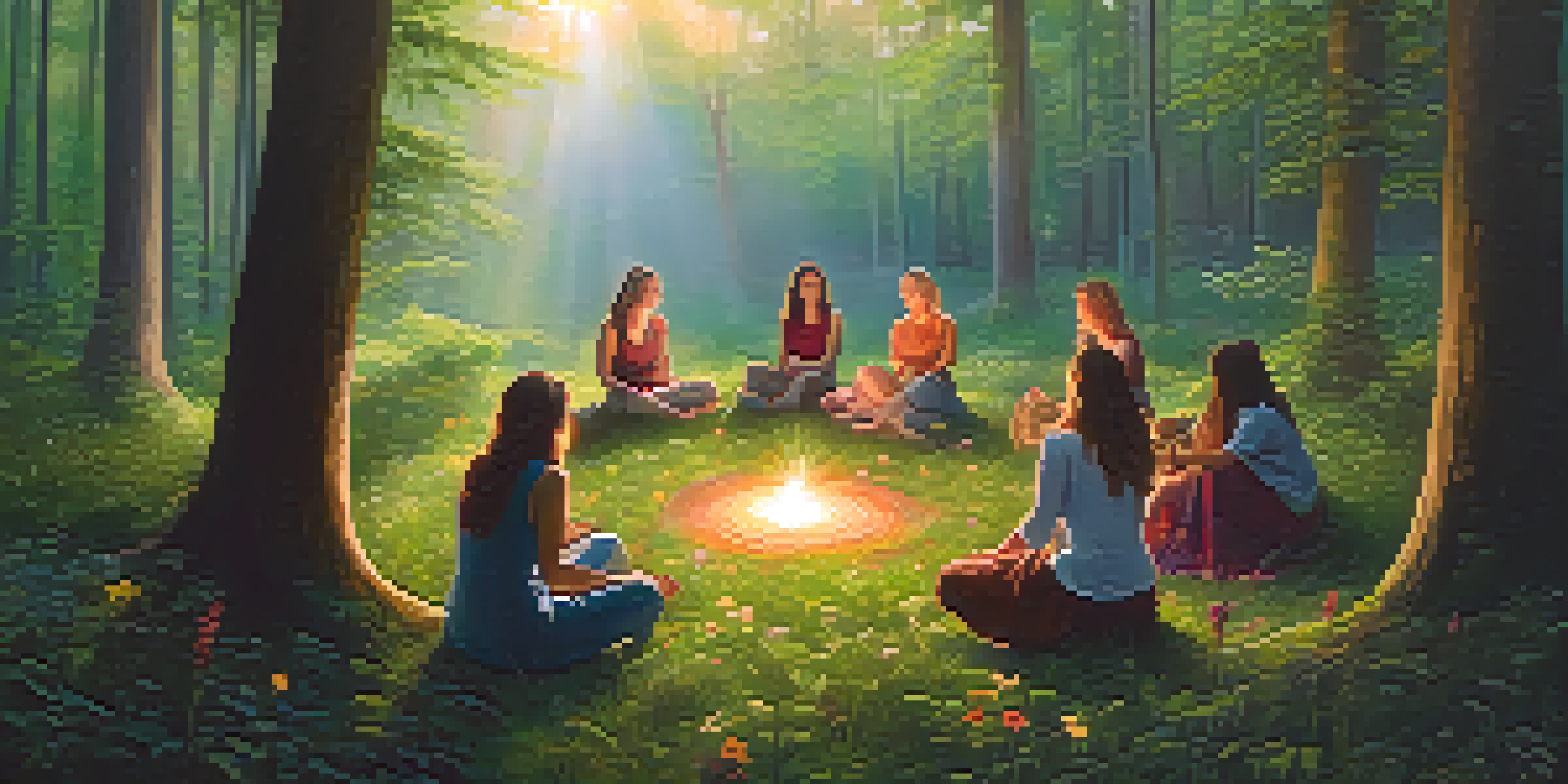The Feminine Experience of Entheogens in Nature

Understanding Entheogens and Their Role in Nature
Entheogens are substances that induce altered states of consciousness, often used in spiritual or healing practices. These natural compounds, like psilocybin mushrooms and ayahuasca, have been utilized by various cultures for centuries. Their role in nature is significant, as they not only enhance personal insight but also foster a deeper connection with the environment.
Nature is not a place to visit. It is home.
For many women, these experiences can be transformative, offering a unique lens through which to view both themselves and the natural world. By engaging with entheogens, women often report heightened senses and a feeling of unity with the earth. This connection can lead to profound moments of self-discovery and emotional healing.
Understanding the feminine perspective on these experiences allows for a richer appreciation of how nature and spirituality intertwine. It emphasizes the importance of nurturing relationships with both self and surroundings, creating a holistic view of well-being.
Historical Context of Women and Entheogens
Throughout history, women have played pivotal roles in the use of entheogens, often serving as healers or shamans within their communities. These roles allowed them to tap into the mystical properties of plants and fungi, passing down knowledge through generations. In many indigenous cultures, women were revered as custodians of nature’s secrets, embodying a deep respect for the earth.

As society evolved, the narratives surrounding women and entheogenic practices often became obscured. However, there has been a resurgence of interest in reclaiming these ancient practices, allowing modern women to reconnect with their heritage. This revival not only honors the past but also empowers women to explore their identities and spirituality.
Entheogens Empower Women's Healing
Engaging with entheogens offers women transformative experiences that enhance self-discovery and emotional healing.
Understanding this historical context enriches the current conversation about entheogens and their impact on women today. It highlights the resilience and strength of women who have long navigated the complexities of nature and spirituality, paving the way for future generations.
The Psychological Benefits of Entheogens for Women
Engaging with entheogens can provide significant psychological benefits, particularly for women facing unique societal pressures. Many report experiences of emotional release and clarity, helping them process trauma or anxiety. This cathartic journey can lead to a renewed sense of self and purpose, crucial in a world that often feels overwhelming.
The wound is the place where the Light enters you.
Moreover, these experiences can enhance emotional intelligence, as women connect more deeply with their feelings and instincts. This heightened awareness fosters a nurturing relationship with oneself, encouraging self-acceptance and growth. It’s as if the veil of everyday life lifts, revealing a landscape rich with possibilities.
By embracing these transformative experiences, women can cultivate resilience and strength. The psychological benefits extend beyond individual healing, contributing to communal well-being as women share their insights and support one another.
Nature as a Catalyst for Entheogenic Experiences
Nature plays a crucial role in the entheogenic experience, serving as both a backdrop and a catalyst for transformation. Many women find that being outdoors enhances their connection to the substances they consume, amplifying the effects and insights gained. The sights, sounds, and smells of nature can create a sensory tapestry that deepens the overall experience.
For instance, a quiet forest can evoke feelings of safety and openness, allowing for deeper introspection. Women often describe their time in nature as a dance of symbiosis, where they feel both supported by and integral to the environment. This reciprocal relationship fosters a sense of belonging and empowerment.
Sisterhood Strengthens Entheogenic Journeys
Community and shared experiences among women create supportive spaces that foster trust, vulnerability, and collective healing.
Engaging with entheogens in natural settings can also encourage environmental stewardship. As women connect with their surroundings, they often feel a renewed commitment to protecting the earth, understanding that their well-being is intertwined with the health of the planet.
Community and Sisterhood in Entheogenic Journeys
The sharing of entheogenic experiences among women often builds a sense of community and sisterhood. Gatherings centered around these practices can create safe spaces for women to explore their spirituality and share insights. This collective experience fosters trust and vulnerability, allowing participants to support one another on their journeys.
In these communal settings, stories and wisdom are exchanged, enriching the understanding of entheogenic practices. Women can draw strength from one another, reinforcing the idea that they are not alone in their experiences. This shared journey can be incredibly empowering, transforming individual insights into collective healing.
As these bonds deepen, women often find themselves inspired to advocate for one another and the environment. The power of sisterhood in these contexts can lead to greater activism and awareness, reinforcing the importance of community in navigating the complexities of entheogenic experiences.
Challenges Faced by Women in Entheogenic Spaces
Despite the many benefits, women often face challenges in entheogenic spaces that can hinder their experiences. Societal stigma surrounding women using psychedelics can create feelings of apprehension or isolation. This pressure can lead to self-doubt, detracting from the potential for healing and growth.
Additionally, the predominance of male voices in the discourse surrounding entheogens can overshadow the feminine perspective. Women may struggle to find representation, which can make it difficult for them to articulate their unique experiences. This lack of visibility can perpetuate feelings of exclusion and diminish their contributions to the conversation.
Historical Roots of Women as Healers
Women have historically played crucial roles in the use of entheogens, reclaiming their heritage and empowering modern exploration.
Recognizing these challenges is essential for creating more inclusive and supportive environments. By amplifying women's voices and experiences, the entheogenic community can foster a richer dialogue, allowing for a more balanced understanding of these powerful substances.
The Future of Women's Experiences with Entheogens
As interest in entheogens continues to grow, the future holds great promise for women's experiences in this realm. A renewed focus on inclusivity and representation can help reshape the narrative, ensuring that women's voices are at the forefront. This shift has the potential to enhance understanding and acceptance of entheogenic practices among diverse populations.
Moreover, as more women share their stories and insights, we can expect to see a flourishing community dedicated to exploration and healing. This collective movement can inspire further research into the benefits of entheogens, particularly in relation to women's health and well-being. By broadening the scope of inquiry, we can uncover new dimensions of understanding.

Ultimately, the future of women's experiences with entheogens will be defined by empowerment, connection, and growth. As women continue to explore their relationship with nature and spirituality, they will undoubtedly pave the way for future generations to thrive in these transformative practices.